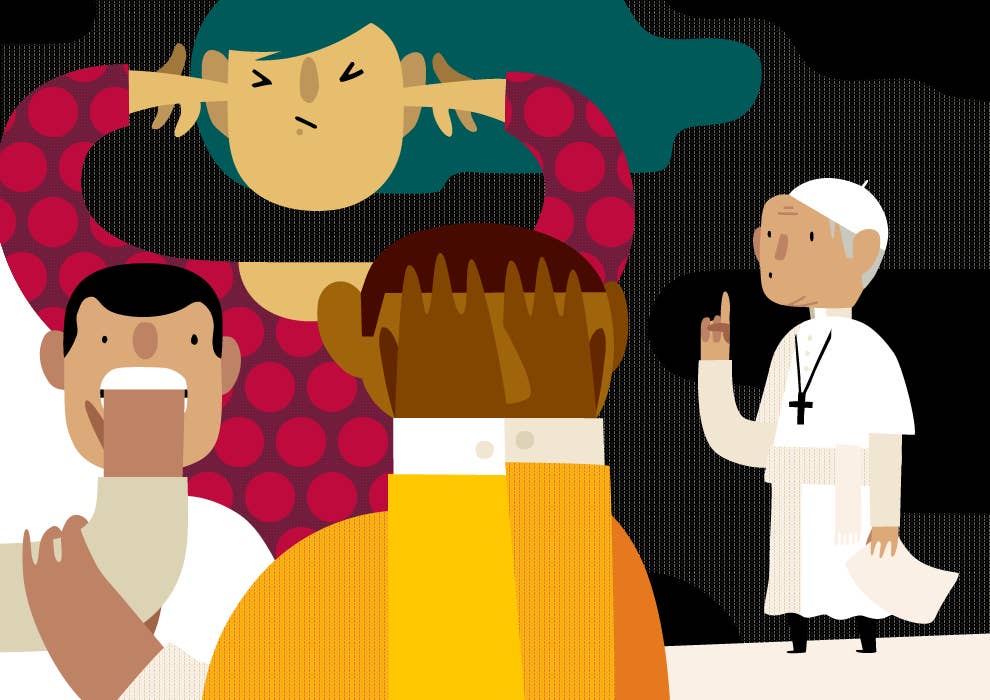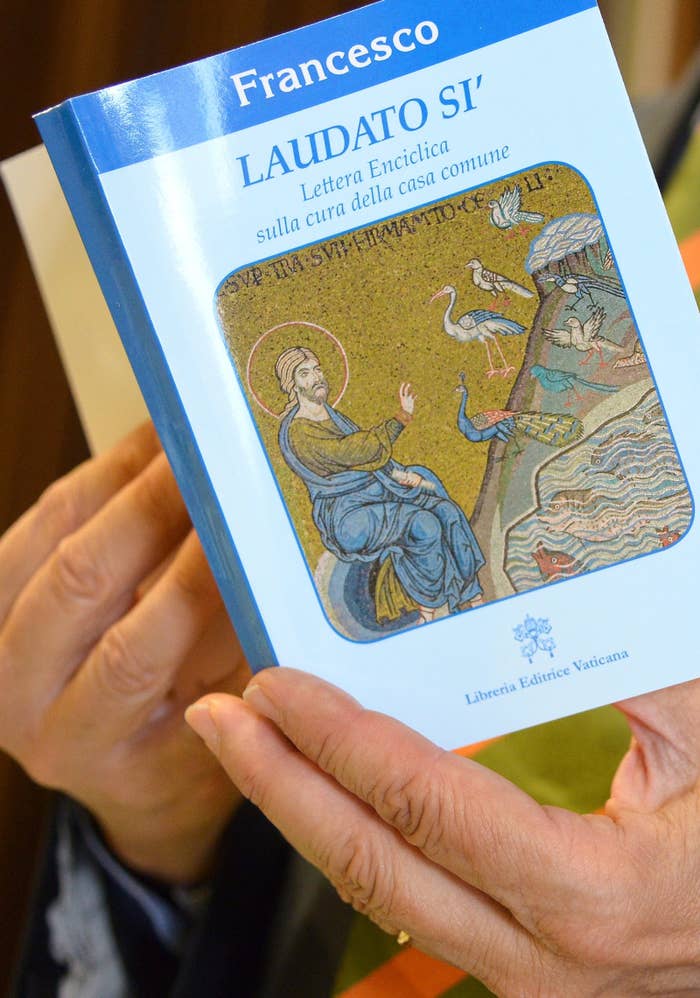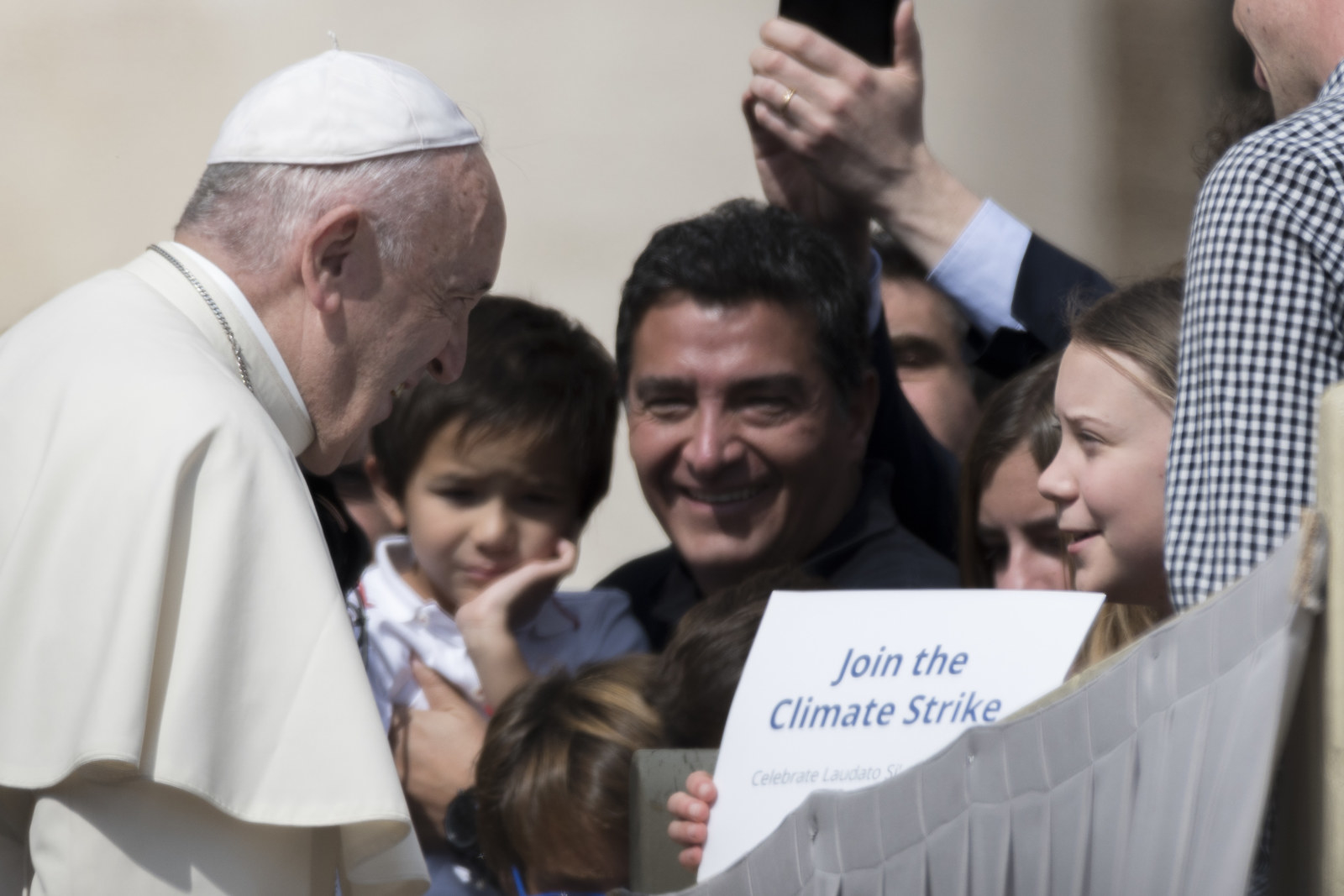
God help us, but it looks like religion isn’t the answer to climate change.
Nearly four years ago, Pope Francis released a groundbreaking letter, Laudato Si, On the Care of Our Common Home, calling on the world — and its 1.2 billion Catholics — to curb manmade global warming.
“We are presently witnessing a disturbing warming of the climatic system,” said the 2015 letter, known as an encyclical. “Humanity is called to recognize the need for changes of lifestyle, production and consumption, in order to combat this warming or at least the human causes.”
The Pope got to hang out with Leonardo DiCaprio, an environmentalist, and the United States Congress, where he enjoyed mixed applause as he also called for the end the death penalty, more kindness to immigrants, and better relations with Cuba.

“Deniers haven’t got a prayer,” said environmental groups at the time, hoping the encyclical, along with similar statements from many religious communities, would steer the devout toward supporting environmental action on moral grounds.
In hindsight, we can say that didn’t work out too well. Despite the relentless climb of global carbon dioxide levels in the atmosphere from burning fossil fuels, worse wildfires, higher-powered hurricanes, widespread floods, and higher global temperatures since 2015, a mass religious movement fighting to cut emissions hasn’t manifested.
“A lot of good-hearted people put a lot of effort into this, but there is no sign of religious people saving us from climate change,” sociologist Bernard Zaleha of the University of California, Santa Cruz, told BuzzFeed News. “I say this as someone who used to think, Wow, if this takes off, it could really make a difference.”
Even in 2015, early opinion polls on the encyclical had mixed results. One, released five months after the Pope’s pronouncement, showed a “Francis Effect” of increased public concern about climate change. But by October 2016, an Annenberg Public Policy Center poll found no evidence of increased public concern about climate among Catholics (or non-Catholics).
Then came the 2016 US election, where 60% of US Catholics who regularly attend mass, and presumably got an earful from the Pope on climate, favored Donald Trump. The president largely sees fixing climate change as “a waste of money,” according to his acting chief of staff, or as a “hoax,” according to his tweets. Trump has rolled back Obama administration steps to limit greenhouse gas emissions from smokestacks and tailpipes, and intends to withdraw the US from the Paris Climate Agreement — precisely the sort of unified, global response to climate change that the Pope was calling for in 2015.
A less-than-immaculate conception of global warming is likewise evident in more recent polls of US Catholics. Overall, there was an increase in those who said that the Earth is warming due to human activity, from 47% in 2015 to 56% in 2017, according to the Pew Research Center. “However, while these data are pre- and post-encyclical, we don’t have any data showing that the Pope’s encyclical is the reason for the change,” Pew’s Anna Schiller told BuzzFeed News by email.
What’s more, the way Catholics responded to that question depended highly on their politics. The share of Catholic Democrats (or leaning that way) who said the Earth is warming due to human activity has increased from 63% in 2015 to 80% in 2017, according to Pew. But the change among Catholic Republicans (or leaners) was not significant, from 26% in 2015 and 22% in 2017. People’s politics pulled more weight than the Pope.
The divide looks even more stark when you separate Latino Catholics from the rest, with immigrants more likely than non-immigrants to accept that climate change is a problem, Zaleha said. “Basically everyone south of the border accepts the huge weight of evidence for climate change, like the rest of the world except for the US, so they come here with those attitudes.”
To give the Pope his due, US Catholics are more likely (74%) than white evangelical Protestants (52%) to say the Earth is getting warmer (about which there is zero doubt; this is like polling whether the planet circles the sun). And some religion scholars say that although the hierarchy of the US and Canadian church is conservative and hasn't embraced the encyclical, Catholic schools and hospitals have.

"Schools see it as a way to have children hold on to their religious identity by showing them the Pope is invested in something they care a lot about, the environment,” sociologist Randolph Haluza-DeLay of the King's University in Alberta, Canada, told BuzzFeed News. "There's more to the Catholic Church than polls taken every six months.”
But others say that the “greening” of religion seems highly unlikely in today’s polarized political climate. Evangelical Christians and conservative Catholics have largely signed on to voting for the Republican party because of its anti-abortion stance (and opposition to same-sex marriage), said Bron Taylor, a University of Florida scholar of religion and the environment. Bucking that to vote for political leaders who would address climate change is a tough ask. Some see Republican politicians such as former congressman Bob Inglis of South Carolina, who lost his seat after he said he wanted to curb global warming, as a warning to others in his party.
Moreover, Taylor said, the outlook of most religions, Eastern and Western alike, is overwhelmingly predisposed to put the environment second to human interests. “The Earth is, at best, a way station to something better, or an encumbrance to be put aside, in many religions,” he said. “The Pope did his best to put his arguments in the spiritual terms of his church, but fundamentally, these are organizations devoted to putting people first.”
Aside from some parishes and denominations that have embraced solar panels and recycling, he said, the business of most Christian pastors and preachers is ministering to the flock— seeing them through divorces, funerals, and other pitfalls. “That’s why we have more priests than prophets,” Taylor said. “Being a prophet sucks, frankly. People yell at you, and don’t believe you.”
The Pope got a little taste of that from his encyclical, with everyone from Republican presidential wannabe Jeb Bush to coal lobbyists throwing grenades at him. “The Pope ought to stay with his job,” Republican Sen. James Inhofe of Oklahoma said at a climate denier conference in 2015.
It’s possible the pope’s climate message will have a long shelf life; Haluza-DeLay noted that a papal encyclical released in the 1890s still informs how the Church talks about labor relations today. But even if it doesn’t, Catholic influence isn’t what it used to be. People without adherence to any religion are the fastest-growing segment of the US population, beating Catholics and evangelicals according to the latest survey. Not coincidentally, they are also among those most likely to see the environment as important, and environmental regulation as worthwhile.
“There will be a tipping point on climate change,” Taylor said, most likely as extreme weather forecasted by climate scientists gets worse. “But it won’t be religious people leading the charge.” ●

